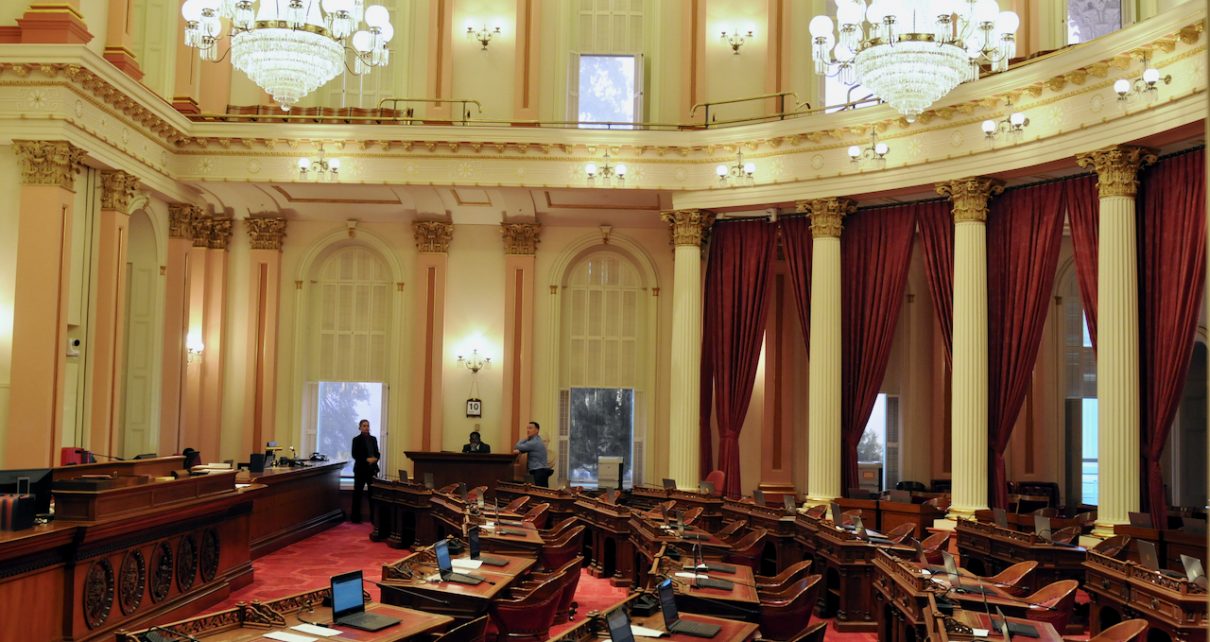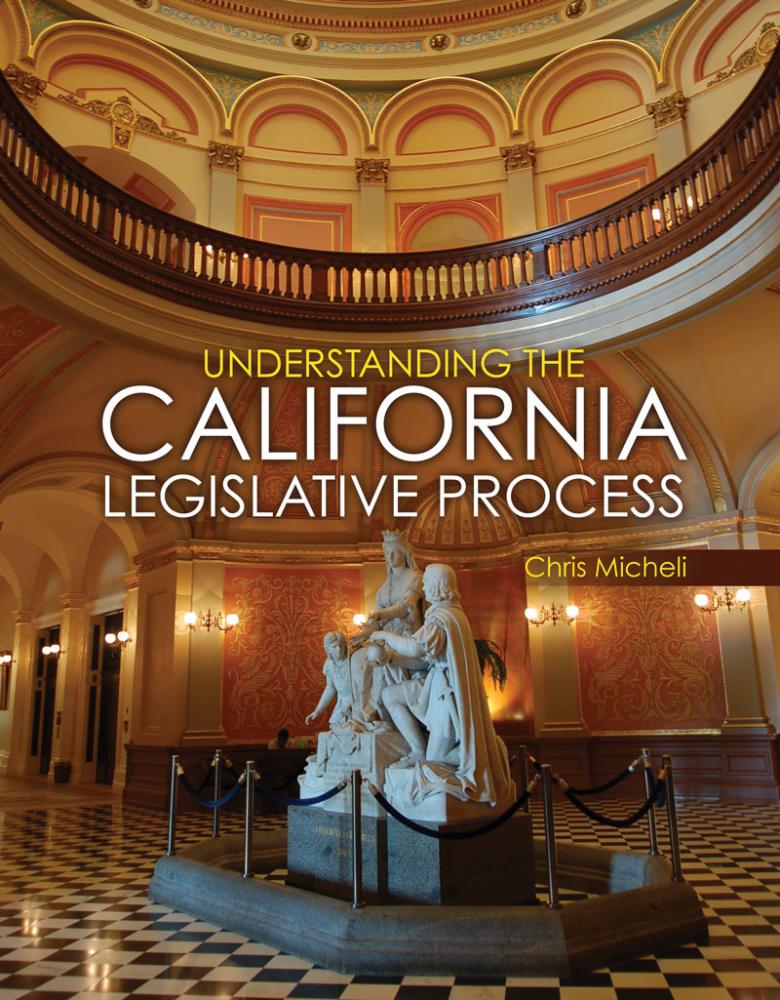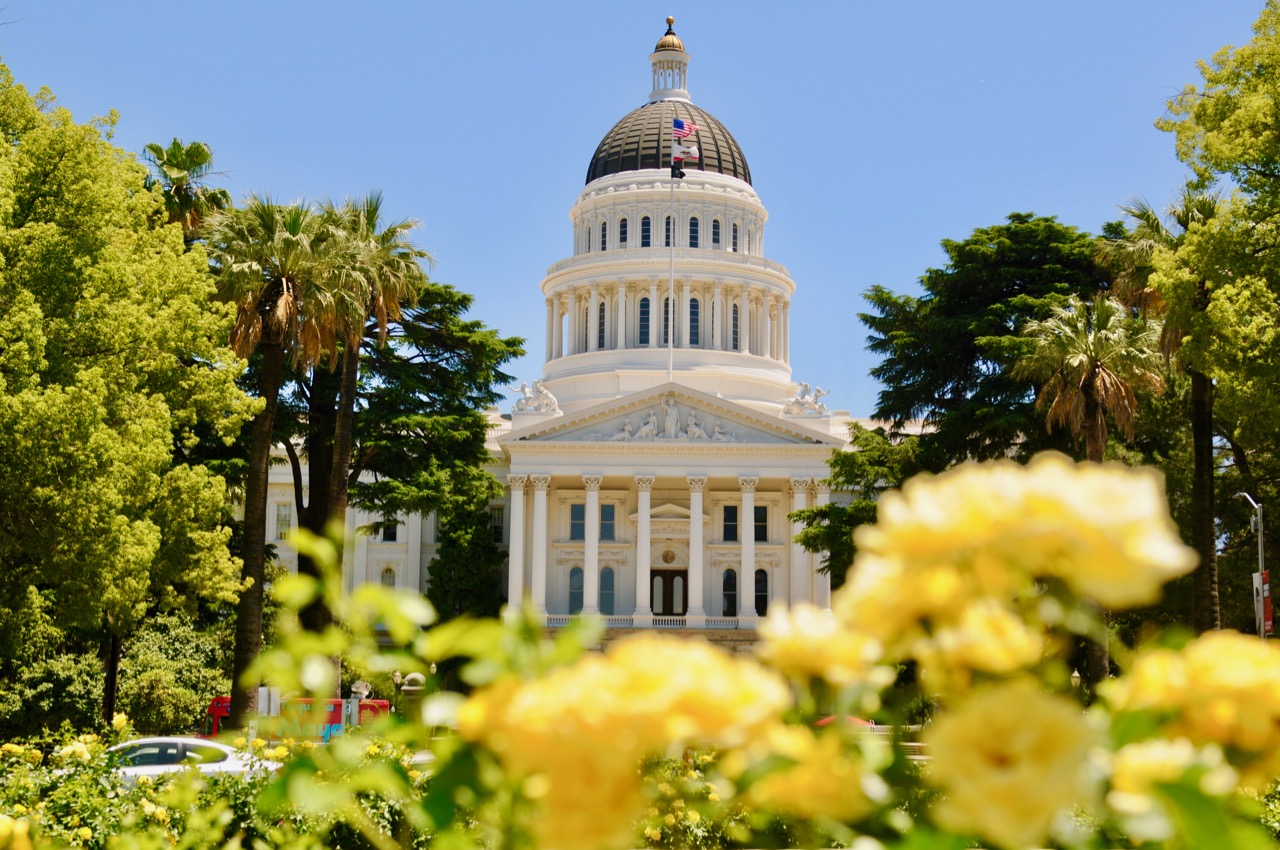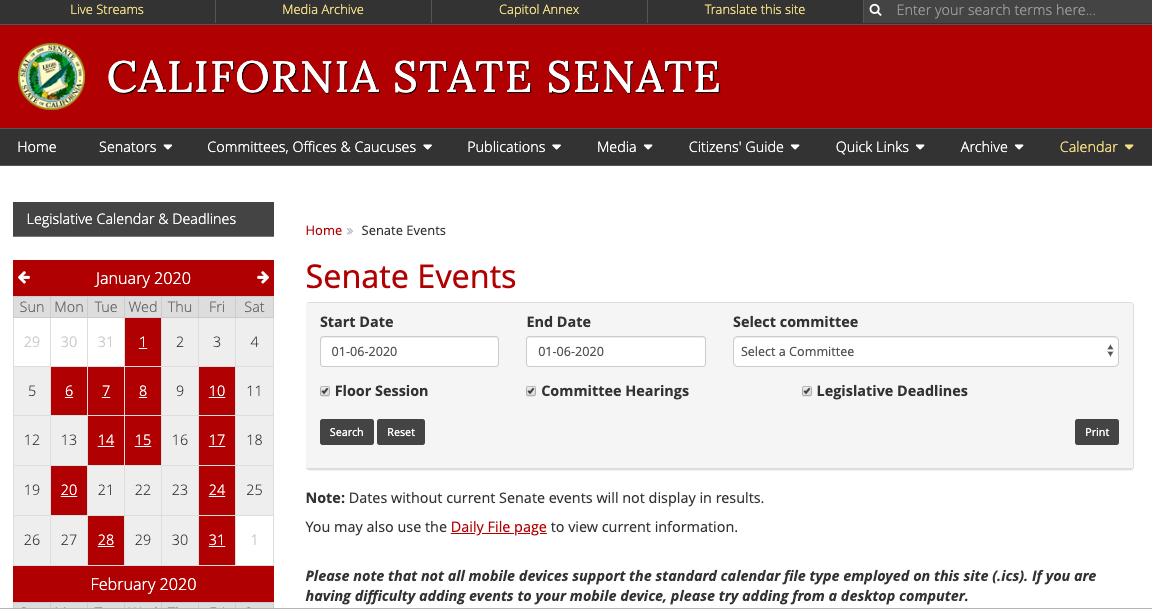
California Senate Chambers. (Photo: Kevin Sanders for California Globe)
An Interesting Bill Involving California Legislative Intent and the ADA
It is up to the federal courts how they want to interpret these legislative intent statements
By Chris Micheli, March 11, 2022 2:45 am
Recently-introduced committee bill, Assembly Bill 2962 (authored by the Committee on Judiciary), presents an interesting case of the role of legislative intent, in particular regarding federal case law. AB 2962 would to add Section 55.4 to the Civil Code, amend Sections 425.50 and 425.55 of, and add Section 425.6 to, the Code of Civil Procedure, and amend Section 70616.5 of the Government Code. The committee bill deals with disability access and specifically construction-related accessibility claims.
According to the Legislative Counsel’s Digest for AB 2962, the bill would clarify, in light of the federal court of appeals’ decision in Arroyo v. Rosas (9th Cir. 2021) 19 F.4th 1202, and other federal district court cases, that no California law related to high-frequency litigants is intended to cause federal courts to decline to exercise supplemental jurisdiction over construction-related accessibility claims.
In addition, the bill would provide that the laws related to construction-related accessibility claims do not express a legislative intent for California courts to maintain exclusive or preferred jurisdiction over such claims, regardless of whether the claim is brought by a high-frequency litigant. Finally, the bill would provide that the laws related to pleading construction-related accessibility claims do not express a legislative intent that federal court should deny supplemental jurisdiction.
Section 1 of the bill provides six legislative findings and declarations as follows:
(a) The Legislature is aware of the discussion of legislative intent in the case of Arroyo v. Rosas (9th Cir. 2021) 19 F.4th 1202, as well as the holdings of previous and subsequent federal district court cases declining to exercise supplemental jurisdiction over claims brought under subdivision (f) of Section 51 or Section 54, 54.1, or 55 of the Civil Code, or Section 19955.5 of the Health and Safety Code, based on the enactment of Sections 425.50 and 425.55 of the Code of Civil Procedure and Section 70616.5 of the Government Code and the procedural requirements set forth in those statutes. The Legislature seeks to correct misunderstandings about its original intent in enacting those statutes.
In subdivision (a), the Legislature explains that it is aware of federal court decisions that it believes have been incorrectly decides and so the Legislature wants to correct these judicial misunderstandings and explain what the intent has always been with these statutes.
(b) The Legislature clearly did not consider or endorse the goal or even the prospect of having all disability rights cases based on construction-related accessibility claims being litigated solely in California courts. In fact, when justifying the need for an urgency statute so that AB 1521 would take effect immediately, the Legislature expressed that it wanted “to ensure that the courts are not overburdened and are able to provide access to the judicial system for all persons seeking redress of their construction-related accessibility claims.”
In subdivision (b), the Legislature states that was silent on ADA claims being litigated entirely in non-California courts.
(c) The Legislature is aware that some federal courts are denying supplemental jurisdiction for all construction-related accessibility claims, occasionally in some instances where the claims are not brought by a high-frequency litigant. The practice of denying these claims, at least as to high-frequency litigants, was improperly endorsed in Arroyo.
In subdivision (c), the Legislature explains that some federal courts have incorrectly denied ADA claims for non-high-frequency litigants.
(d) It is the expressed intent of the Legislature that federal courts should not rely on or construe the operative or uncodified language and procedural requirements of Section 425.50 or 425.55 of the Code of Civil Procedure, the enhanced filing fees established by Section 70616.5 of the Government Code, or any other procedural requirements or limitations enacted by the Legislature with respect to construction-related accessibility claims, to deny supplemental jurisdiction over said claims brought in federal court and that denial of supplemental jurisdiction under Section 1367(c)(4) of Title 28 of the United States Code, or for any other reason, works against the interests of comity with California law. The Legislature finds that denying supplemental jurisdiction over such claims would frustrate, rather than advance, the intent of the Legislature, the interests of comity, and the administration of justice. Further, such an outcome would require California courts to litigate federal questions, create unreasonable burdens for all litigants and California courts, and delay the resolution of disputes, thereby further frustrating the purpose of California’s statutory civil rights scheme, which is to ensure that people with disabilities have full and equal access to their communities and that these matters are resolved in as prompt a fashion as possible, without undue burdens on the rights of any parties. The Legislature also hereby clarifies the fact that when enacting or amending Section 425.50 or 425.55 of the Code of Civil Procedure or Section 70616.5 of the Government Code, it was and remains the position of the Legislature that existing federal law can and does adequately address the Legislature’s concerns about construction-related accessibility claims and litigation of those claims by high-frequency litigants. The Legislature was aware of federal pleading standards, as well procedural tools, such as General Order 56 of the United States District Court for the Northern District of California, and has acted with an intent to bring state law pleading standards into greater alignment with federal standards and said procedural tools.
In subdivision (d), the Legislature makes clear that federal courts are not to rely upon procedural requirements or limits for ADA claims in order to deny federal jurisdiction on these claims. In addition, denying federal supplemental jurisdiction is contrary to legislative intent. Existing federal law can address ADA claims by high-frequency litigants, and state law should be brought into conformity with federal pleading standards.
(e) Therefore, a clarification of legislative intent is required to avoid an unintended outcome and the flooding of state courts with disability rights cases and claims related to construction-related accessibility claims that can and should be adjudicated in federal courts. This is particularly true in cases where state law claims are based on the same factual allegations as violations of the federal Americans with Disabilities Act of 1990. This is true regardless of whether those cases are filed by a high-frequency litigant.
In subdivision (e), the Legislature explains that its intent must be clarified to ensure that state courts are not inundated with these types of cases that are more appropriate to be resoled in federal courts because they rely upon the same federal ADA violations.
(f) Accordingly, new statutes, clarifying legislative intent with respect to Sections 51, 54, 54.1, and 55 of the Civil Code, Sections 425.50 and 425.55 of the Code of Civil Procedure, and Section 70616.5 of the Government Code, among others, are hereby enacted.
In subdivision (f), the Legislature states that it is enacting new code sections in order to clarify legislative intent.
Section 2 of the bill would add new Civil Code Section 55.4 as follows:
This division does not express a legislative intent to maintain exclusive or preferred jurisdiction of state courts over causes of action under Section 51, 54, 54.1, or 55 of this code, or Section 19955.5 of the Health and Safety Code, for a construction-related accessibility claim, as defined in Section 55.52, regardless of whether the cause of action is brought by a high-frequency litigant, as defined in subdivision (b) of Section 425.55 of the Code of Civil Procedure. The fact such construction-related accessibility claims may be triggered by, or related to, a violation of the federal Americans with Disabilities Act of 1990 (Public Law 101-336) is irrelevant to the legislative intent in this regard.
This new provision of law states that the Legislature does not intend to prefer state courts have jurisdiction over ADA claims regardless of whether they are brought by high-frequency litigants, and federal law ADA claims do not impact legislative intent in this regard.
Section 3 of the bill would amend Code of Civil Procedure Section 425.50 by adding the following new subdivision:
(g) Notwithstanding this section or any other provision of state law governing construction-related accessibility claims, including subdivision (b) of Section 425.55 of this code and Section 70616.5 of the Government Code, it is the intent of the Legislature that federal courts should not rely on or construe the operative or uncodified language and procedural requirements of those laws to deny supplemental jurisdiction over said claims brought in federal court and that denial of supplemental jurisdiction under Section 1367(c)(4) of Title 28 of the United States Code, or for any other reason, works against the interests of comity with state law and the intent of said laws.
This new section of law provides legislative intent that federal courts should not rely on certain language or procedural requirements as a basis for denying federal jurisdiction over claims brought in federal court.
Section 4 of the bill would amend Code of Civil Procedure Section 425.55 by adding the following new language to subdivision (a)(3):
(3) Therefore, given these special and unique circumstances, the provisions of this section are warranted for this limited group of plaintiffs. Notwithstanding subdivision (b) or any other provision of state law governing construction-related accessibility claims, including Section 425.50 of this code or Section 70616.5 of the Government Code, it is the intent of the Legislature that federal courts should not rely on or construe the operative or uncodified language and procedural requirements of those laws to deny supplemental jurisdiction over said claims brought in federal court and that denial of supplemental jurisdiction under Section 1367(c)(4) of Title 28 of the United States Code, or for any other reason, works against the interests of comity with state law and the intent of said laws.
This new section of law provides legislative intent that federal courts should not rely on certain language or procedural requirements as a basis for denying federal jurisdiction over claims brought in federal court.
Section 5 of the bill would add new Code of Civil Procedure Section 425.6 as follows:
This article does not express a legislative intent to maintain exclusive or preferred jurisdiction of state courts over causes of action under Section 51, 54, 54.1, or 55 of the Civil Code, or Section 19955.5 of the Health and Safety Code, for a construction-related accessibility claim, as defined in Section 55.52 of the Civil Code, regardless of whether the cause of action is brought by a high-frequency litigant, as defined in subdivision (b) of Section 425.55. The fact such construction-related accessibility claims may be triggered by, or related to, a violation of the Americans with Disabilities Act of 1990 is irrelevant to the legislative intent in this regard.
This new provision of law states that the Legislature does not intend to prefer state courts have jurisdiction over ADA claims regardless of whether they are brought by high-frequency litigants, and federal law ADA claims do not impact legislative intent in this regard.
Section 6 of the bill would amend Government Code Section 70616.5 by adding the following new subdivision:
(d) This section does not express a legislative intent to maintain exclusive or preferred jurisdiction of state courts over causes of action under Section 51, 54, 54.1, or 55 of the Civil Code, or Section 19955.5 of the Health and Safety Code, for a construction-related accessibility claim, as defined in Section 55.52 of the Civil Code, regardless of whether the cause of action is brought by a high-frequency litigant. The fact such construction-related accessibility claims may be triggered by, or related to, a violation of the federal Americans with Disabilities Act of 1990 (Public Law 101-336) is irrelevant to the legislative intent in this regard.
This new provision of law states that the Legislature does not intend to prefer state courts have jurisdiction over ADA claims regardless of whether they are brought by high-frequency litigants, and federal law ADA claims do not impact legislative intent in this regard.
In each instance of these new provisions being added to existing state law, the California Legislature is expressing clear intent regarding how it wants the federal courts to interpret and apply provisions of state law, especially in cases where there are corresponding federal law provisions. This is entirely within the authority of the Legislature to do. However, it is up to the federal courts, which are not under the jurisdiction of the State of California, regarding how they want to interpret these legislative intent statements.
- Mergers of Unincorporated Associations - February 21, 2026
- A Historic Look at Bill Introductions in the California Legislature - February 21, 2026
- Construction of Eminent Domain Law - February 21, 2026




